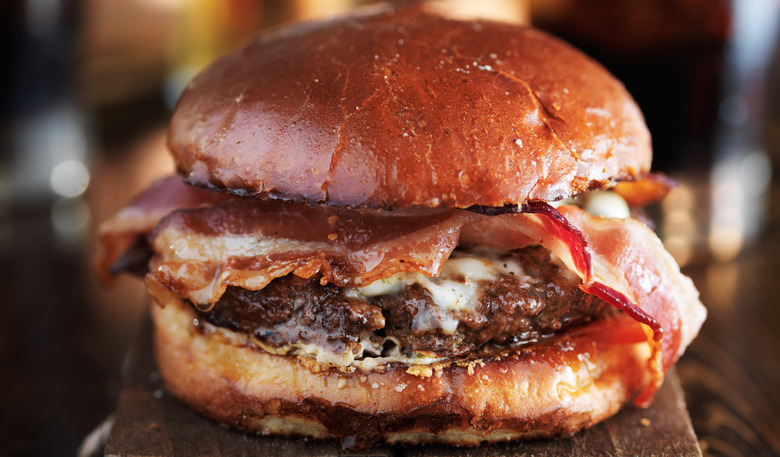Putting Your Burger On A Brioche Bun Is A Terrible Idea
You've probably noticed that within the past decade or so there's been a burger revolution of sorts. Burgers used to be, almost exclusively, the domain of diners, sports bars, and other blue-collar-type establishments, but nowadays no restaurant worth its salt, unless it's a tasting-menu-only "experience," opens without a cheffed-up burger on its menu. And more often than not, it seems as if brioche is the bun of choice. But that choice happens to be terrible.
We get it. A brioche bun is a fancy bun. It's got the French name, it's got the shiny egg-washed top. It's soft and easy to bite into. And "an eight-ounce dry-aged blend topped with Grafton Cheddar and caramelized onions on a brioche bun" sounds a lot better than "an eight-ounce dry-aged blend topped with Grafton Cheddar and caramelized onions on a Wonder bun." But the fact of the matter is that even a cheapo supermarket burger bun is better than a brioche one.
For one, brioche buns are far too sweet. They're sugary and eggy, and work much better in sweet applications than savory ones. In France, brioche is considered a viennoiserie, which means it is looped in with other breakfast breads like croissants and danishes. It's made with loads of butter, sugar, and milk, and only has a handful of savory applications, like foie gras en croute. But no Frenchman would consider using brioche for sandwich bread; it's just too sweet. In fact, brioche is so associated with dessert that when Marie Antoinette (apocryphally) uttered "Qu'ils mangent de la brioche," it was translated to "Let them eat cake."
Second, and perhaps more importantly, brioche is simply too delicate to support a half-pound puck of griddled ground beef. It's not structurally built to encase a burger; it's by definition light and airy. Burgers release a large amount of juice and fat (at least the good ones do anyway), and a brioche bun will completely sog through and fall apart before you're even halfway through it.
The ideal burger bun is structurally sound enough to not fall apart, neutral in flavor enough to not distract from the beef, soft enough to easily bite through, big enough to envelop the whole burger, and small enough to not completely overwhelm it. Plenty of buns don't match these criteria, and brioche is one of them (others that fail the test include baguettes, focaccia, and ciabatta). Thankfully, plenty of bun types do pass the test, including standard supermarket hamburger buns and potato buns for smaller patties; Kaisers, sourdough rolls, and potato buns for bigger patties (as long as they're not too dense or crusty); and English muffins (we're fans of the larger "sandwich size" ones). Stick to a bun that can pass the test.
